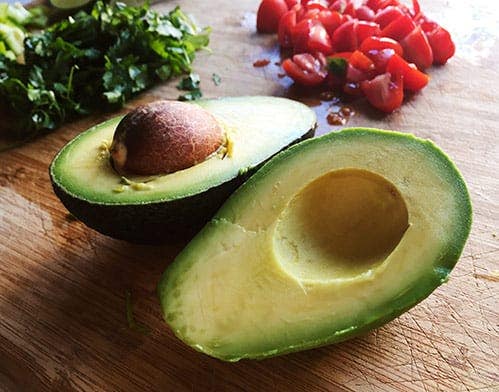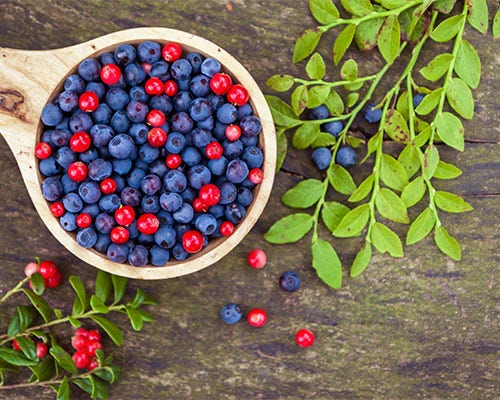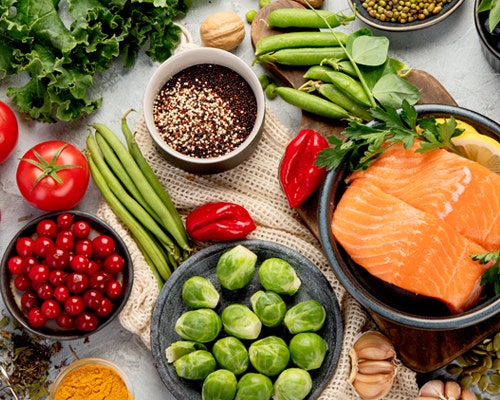Sweet, Refreshing Organic Fruits!
- 7/24/16

Summertime—and really anytime—is a great time to enjoy fresh fruit. You can have them as healthy snacks, desserts or use them in smoothie, salad, popsicle or fruit pops recipes!
Here are some refreshing fruits to try:
Bananas: Go ahead and go bananas with bananas! With only approximately 110 nutrient-dense calories per serving, bananas are a smart, convenient addition to your diet. They provide vitamin B6, vitamin C, vitamin A, iron, niacin, riboflavin, folate, potassium, manganese, magnesium, protein and fiber.
Mangos: One cup of mangos delivers only 100 calories, but 100% of your Daily Value (DV) of vitamin C, 35% DV of vitamin A, and 12% DV of fiber, plus no cholesterol, sodium or fat. In short, mangos are superfoods, containing over 20 different vitamins and minerals.
Peaches: Plentiful in summer, especially from June through the end of August, peaches are “peachy” additions to your diet! A large peach contains fewer than 70 calories, while supplying a good source of vitamin A and vitamin C as well as fiber.
These Fruit Pops from Chef Gwen are refreshing, cooling and nutritious! Try one or try them all. You’re going to love them!
Apples: Packed with antioxidant vitamins, including vitamin C, apples can protect bodily cells against free radical damage. Apples also contain quercetin, a powerful antioxidant, which helps bolster immune system function, neurological health and brain health.
Blueberries: Blueberries contain vitamins C, K and the mineral manganese as well as flavonoids called anthocyanins—powerful antioxidants. Eating just one cup of blueberries weekly helps fight free radicals and support cellular health, healthy cholesterol levels as well as cardiovascular and mental health.
Cherries: Cherries contain vitamin C, potassium and plenty of the antioxidant anthocyanin. Adding cherries to the diet can help reduce cholesterol and lower additional risk factors for heart disease, including managing unhealthy inflammation levels and body fat levels.
Oranges: Mouth-watering, citrus-packed oranges are one of the most popular fruits worldwide. They offer a burst of energizing nutrition, including vitamin C, folate, vitamin B1, pantothenic acid, potassium, calcium and fiber.
Grapes: Resveratrol-rich grapes are powerful antioxidants to bolster cellular, cardiovascular, nervous system, brain and overall health. They’re also brimming with anthocyanins, catechins, iron (mostly in dried grapes or raisins) manganese, potassium, vitamins C, A, K and B-complex.
Kiwi Fruit: Not all fruits can boast omega-3 fatty acids, but kiwis can. Additionally, kiwis are rich sources of heart-, blood pressure- and cell-healthy potassium as well as offering good amounts of vitamins C, A, E and K, iron, magnesium and manganese.
Lemons: Lemons contain vitamins C and B-complex, potassium, iron, calcium and magnesium, supporting a healthy immune system and inflammation levels. Like other citrus fruits, lemons contain the flavonoid glycosides hesperetin, naringin and naingenin which act as powerful antioxidants, anti-inflammatories and immune system modulators.
Papayas: Low in calories and high in vitamins, minerals and phytonutrients, papayas contain some of the highest vitamin C content—more than oranges or lemons—for antioxidant, immune and anti-inflammatory benefits. Papayas are also rich in vitamin A, B-complex vitamins and potassium.
Pomegranates: Boasting high-antioxidant strength, pomegranates also contain heart-healthy ellagitannin compounds, immune-supporting vitamin C as well as some B vitamins, vitamin K, calcium, potassium and manganese for weight, cholesterol and cellular benefits.
Raspberries: Loaded with vitamin C, manganese and fiber, raspberries provide antioxidant and anti-inflammatory benefits. Likewise, raspberries are noted for their blood sugar and cellular benefits as well as helping with weight management.
Strawberries: Bursting with vitamin C, and like blueberries, strawberries contain those powerful antioxidants—flavonoids called anthocyanins. Eating just two cups of strawberries per week can support mental sharpness as well as cardiovascular, cellular and blood pressure health.
Watermelons: Hydrating and electrolyte-rich, watermelons are great as warm-weather thirst quenchers, but also deliver vitamins A, C, B1, B6, lycopene, beta-carotene, lutein, zeaxanthin and cryptoxanthin—nutrients and antioxidants to support cellular, skin and overall health.
Be sure to enjoy the refreshing, nutritious power of fruits!
Here are some refreshing fruits to try:
Bananas: Go ahead and go bananas with bananas! With only approximately 110 nutrient-dense calories per serving, bananas are a smart, convenient addition to your diet. They provide vitamin B6, vitamin C, vitamin A, iron, niacin, riboflavin, folate, potassium, manganese, magnesium, protein and fiber.
Mangos: One cup of mangos delivers only 100 calories, but 100% of your Daily Value (DV) of vitamin C, 35% DV of vitamin A, and 12% DV of fiber, plus no cholesterol, sodium or fat. In short, mangos are superfoods, containing over 20 different vitamins and minerals.
Peaches: Plentiful in summer, especially from June through the end of August, peaches are “peachy” additions to your diet! A large peach contains fewer than 70 calories, while supplying a good source of vitamin A and vitamin C as well as fiber.
These Fruit Pops from Chef Gwen are refreshing, cooling and nutritious! Try one or try them all. You’re going to love them!
Apples: Packed with antioxidant vitamins, including vitamin C, apples can protect bodily cells against free radical damage. Apples also contain quercetin, a powerful antioxidant, which helps bolster immune system function, neurological health and brain health.
Blueberries: Blueberries contain vitamins C, K and the mineral manganese as well as flavonoids called anthocyanins—powerful antioxidants. Eating just one cup of blueberries weekly helps fight free radicals and support cellular health, healthy cholesterol levels as well as cardiovascular and mental health.
Cherries: Cherries contain vitamin C, potassium and plenty of the antioxidant anthocyanin. Adding cherries to the diet can help reduce cholesterol and lower additional risk factors for heart disease, including managing unhealthy inflammation levels and body fat levels.
Oranges: Mouth-watering, citrus-packed oranges are one of the most popular fruits worldwide. They offer a burst of energizing nutrition, including vitamin C, folate, vitamin B1, pantothenic acid, potassium, calcium and fiber.
Grapes: Resveratrol-rich grapes are powerful antioxidants to bolster cellular, cardiovascular, nervous system, brain and overall health. They’re also brimming with anthocyanins, catechins, iron (mostly in dried grapes or raisins) manganese, potassium, vitamins C, A, K and B-complex.
Kiwi Fruit: Not all fruits can boast omega-3 fatty acids, but kiwis can. Additionally, kiwis are rich sources of heart-, blood pressure- and cell-healthy potassium as well as offering good amounts of vitamins C, A, E and K, iron, magnesium and manganese.
Lemons: Lemons contain vitamins C and B-complex, potassium, iron, calcium and magnesium, supporting a healthy immune system and inflammation levels. Like other citrus fruits, lemons contain the flavonoid glycosides hesperetin, naringin and naingenin which act as powerful antioxidants, anti-inflammatories and immune system modulators.
Papayas: Low in calories and high in vitamins, minerals and phytonutrients, papayas contain some of the highest vitamin C content—more than oranges or lemons—for antioxidant, immune and anti-inflammatory benefits. Papayas are also rich in vitamin A, B-complex vitamins and potassium.
Pomegranates: Boasting high-antioxidant strength, pomegranates also contain heart-healthy ellagitannin compounds, immune-supporting vitamin C as well as some B vitamins, vitamin K, calcium, potassium and manganese for weight, cholesterol and cellular benefits.
Raspberries: Loaded with vitamin C, manganese and fiber, raspberries provide antioxidant and anti-inflammatory benefits. Likewise, raspberries are noted for their blood sugar and cellular benefits as well as helping with weight management.
Strawberries: Bursting with vitamin C, and like blueberries, strawberries contain those powerful antioxidants—flavonoids called anthocyanins. Eating just two cups of strawberries per week can support mental sharpness as well as cardiovascular, cellular and blood pressure health.
Watermelons: Hydrating and electrolyte-rich, watermelons are great as warm-weather thirst quenchers, but also deliver vitamins A, C, B1, B6, lycopene, beta-carotene, lutein, zeaxanthin and cryptoxanthin—nutrients and antioxidants to support cellular, skin and overall health.
Be sure to enjoy the refreshing, nutritious power of fruits!




